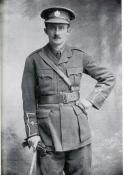
War Memorial
| Lieutenant Hugh Montagu BUTTERWORTH | |
|
D Company, 9th (Service) Battalion Rifle Brigade (The Prince Consort’s Own) Date of birth: 1st November 1885 Date of death: 25th September 1915 Killed in action aged 29 Commemorated on the Menin Gate Panels 46-48 and 50 |

|
| Hugh Montagu Butterworth was born in Saffron Walden in Essex on the 1st of November 1885 the son of George Montagu Butterworth, a solicitor, and Catherine Lucie (nee Warde) Butterworth of The Cashmeer Hills, Christchurch New Zealand, formerly of Westward Ho! in Devon and later of 5 Brunswick Terrace, Swindon. He was christened at Saffron Walden on the 18th of December 1885. He was educated at Hazelwood School until July 1899 where he was a member of the Cricket XI in 1897, 1898 and 1899, and of the Football XI in 1897 and 1898. He was a member of the Choir and won the School Fencing Competition in 1897. The school magazine wrote of his 1897 cricket season: - "A merry batsman, and much too merry fieldsman. A likely bowler, and promising all round man." Of his 1898 cricket season they wrote: - "Improving fast in batting, combining fearless hitting with much better timing and watching of the ball. A good and active field on the ground, but a catch in his direction makes those who know him feel quite faint. Used to bowl, but has lost all control over the ball." They noted the following in relation to his 1899 cricket season: - "A great disappointment as a bat; ought to have been far better, as he can hit hard and also play steadily, but he practically made no improvement. Came out as a very difficult bowler latterly. Never safe in the field, but fairly useful." They wrote the following of his 1897 football season: - " Centre forward, a player of excellent promise which he signally failed to carry out in matches from overexcitement. Was a fast dashing player very hard to stop, and a good shot at goal, and will be, when he gets a steady head on his shoulders." Of his 1898 football season they wrote: - "A keen, fast, and dashing forward (inside left) with a tendency however to stick to them ball too long, a fair shot and on his day the most effective man in the XI." When he left the school he was described in the magazine thus:- ".....goes to Marlborough with a great reputation for every branch of athletics, a more than useful musician and quite at the top of the tree as an actor." He went on to Marlborough College where he was in C2 House from September 1899 to July 1904. While he was there he was Captain of the Cadet Corps and was a member of the Cricket XI in 1903 and 1904, the Hockey XI in 1903 and 1904, the Rugby XV in 1903 and the Football XI in 1903/04. While playing cricket during the 1901 season he was so badly injured during a game that he had to undergo an operation and missed much of the term as a result. He also represented the school at Racquets, being appointed as Captain in 1903, and appeared in the Public Schools Championships at the Queen's Club in the summer of 1904. He was a good but “unlucky” athlete, being badly injured in his first house match and having to undergo an operation. He played county cricket for Wiltshire on 21 occasions between August 1904 and August 1906. In October 1904 he went on to University College, Oxford, where he represented the University at Football, Cricket, Racquets and Hockey, also winning the Freshman’s 100 yards race, but a bad knee meant that he only achieved a “Blue” in Racquets. His racquets doubles partners were Mr Clarence Bruce in 1905 and Mr Godfrey Foster in 1906. He did not graduate from Oxford, instead he joined his family when they decided to emigrate to New Zealand in April 1907. He applied for, and was accepted as, an Assistant Master at Wanganui Collegiate School New Zealand in 1907 where he represented Wanganui in five cricket matches between 1910 and late 1914 including a match against Australia on the 18th of March 1910 where he opened the batting. He became the first House Tutor of the newly opened Selwyn House in 1911. Following the outbreak of war he tendered a month's notice to the College and booked passage back to England in January 1915 to enlist in the army. On his return he reported to Tavalera Barracks at Aldershot on the 6th of March 1915 to complete his application for a commission. He was commissioned as a 2nd Lieutenant in the 9th Battalion Rifle Brigade, and after training he embarked with them at Folkestone on the 20th of May 1915, landing at Boulogne. Following a period of being on the defensive during 1915 the British planned a major offensive which was to begin on the 25th of September 1915. They also planned a series of diversionary attacks for the same day, further up the line, to distract the Germans from the main attack at Loos. The 9th Battalion Rifle Brigade were to attack a German trench system in the Ypres Salient, to the north eastern end of Railway Wood, and to then dig to link up the captured trenches with the existing British ones, which would have the effect of reducing the German dominance of the Bellewaarde Ridge as well as diverting their attention from the offensive further to the south. The battalion's attack was to be preceded by the explosion of two mines which were set to detonate underneath the German first line at 4.19am. Hugh Butterworth wrote the following in his last letter, posted the night before the attack:- “I am leaving this in the hands of the transport officer, and if I get knocked out, he will send it on to you. We are going into a big thing. It will be my pleasant duty to leap lightly over the parapet and lead "D" Company over the delectable confusion of old trenches, crump holes, barbed wire that lies between us and the Bosche and take a portion of his front line. Quo facto, I shall then proceed to bomb down various communication trenches and take his second line. In the very unlikely event of my being alive by then I shall dig in like the blazes and if God is good, stop the Bosche counter-attack, which will come in an hour or two. If we stop that, I shall then, in broad daylight, have to get out, wire in front under machine gun fire and probably stop at least one more counter attack and a bomb attack from the flank. If all that happens successfully and I'm still alive, I shall hang on until relief. Well, when one is faced with a programme like that, one touches up one's will, thank heaven one has led a fairly amusing life, thanks God one is not married, and trusts in Providence. Unless we get more officers before the show, I am practically bound to be outed as I shall have to lead all these things myself. Anyway if I do go out I shall do so amidst such a scene of blood and iron as even this war has rarely witnessed. We are going to bombard for a week, explode a mine and then charge. One does see life doesn't one? Of course there is always a chance of only being wounded and the off-chance of pulling through. Of course one has been facing death pretty intimately for months now, but with this ahead, one must realise that, in the vernacular of New Zealand, one's numbers are probably up. We are not a sentimental crowd at the Collegiate School, Wanganui, but I think in a letter of this sort, one can say how frightfully attached one is to the old brigade. Also I am very, very much attached to the School and to Selwyn in particular. There are two thousand things I should like to say about what I feel, but they can't be put down, I find. Live long and prosper, all of you. Curiously enough, I don't doubt my power to stick it out, and I think my men will follow me." At 3.50am on the morning of the 25th of September 1915 the British preparatory barrage reached a crescendo as they hammered the first and enemy second lines. At 4.19am the mines exploded and at 4.20am the men of the Rifle Brigade, led by A and B Companies, climbed out of the trenches and into no man's land. At the same time the men of D Company began digging furiously to create a communication trench which would link the new mine crater with the British front line. The German front trench quickly fell but the assaulting companies were soon embroiled in close quarter fighting and at 4.45am Hugh Butterworth led two platoons of D Company to support the increasingly beleaguered men of B Company. As they crossed the open ground they were met with a withering fire from machine guns in enfilade. Most were lost crossing no man's land with some reaching the former enemy front line where they reinforced their colleagues from A and B Companies. It was around this time that Hugh Butterworth was killed. The Chaplain of his brigade wrote: - "He was loved at University (University College, Oxford) and he was loved in the Rifle Brigade." A friend at Oxford wrote that he was:- "one of the most loved and lovable of men." His commanding officer, Colonel W. Villiers-Stuart, wrote to his sister:- "Dear Madam, I cannot express my sadness at having to tell you of the death of your gallant brother, in action on September 25th. He led his company most bravely, and for a time all went well, but the German counter-attacks were very heavy and our men were forced back by bomb attacks in great force. It was in leading a few men to counter-attack one of these that your brother met his death. With him I lost all my officers but three. All his time with me your brother showed the most conspicuous coolness and courage, and he can never be replaced as an officer. I have no words to express my regret for you at his loss. Your brother's name had long been sent in for Captain's rank.” His letters from the front were published as a book by Wanganui School as “Letters from Flanders”, published in 1916 by Whitcombe and Tombs Ltd of Wellington, New Zealand. He is commemorated on the war memorial at Marlborough College and by a cricket pavilion which was built in his memory at the Collegiate School Wanganui. |
|
| Went on to Marlborough College |
Back